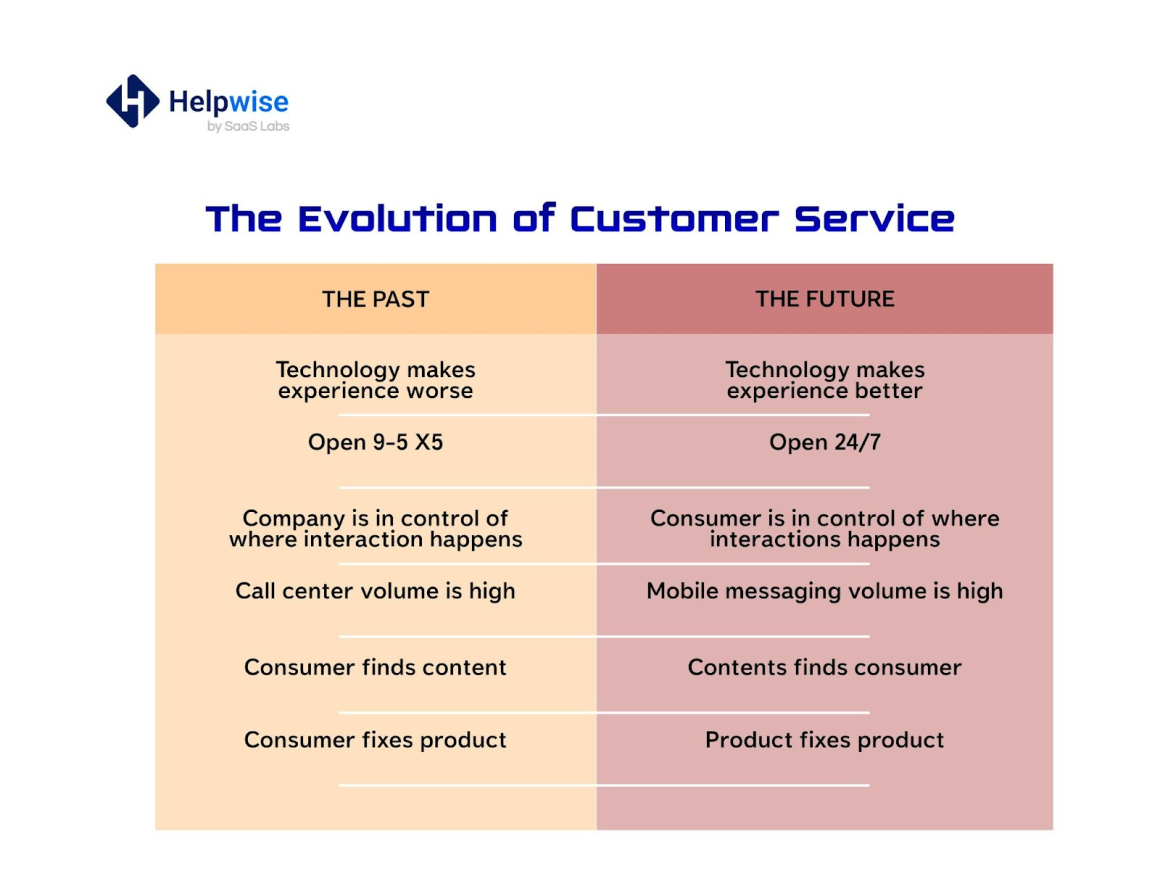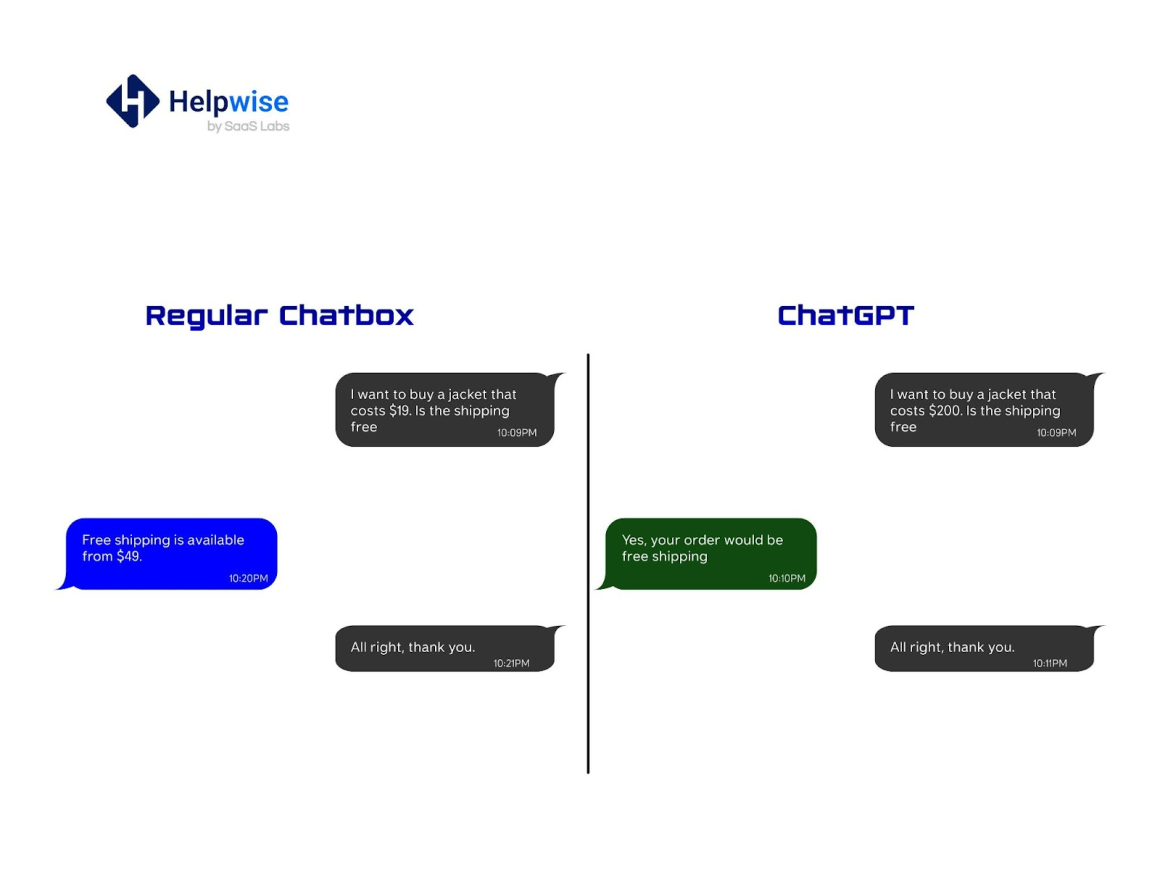It’s the early 2000s. Flip phones were all the rage, dial-up internet was still a thing, and the sound of “You’ve got mail!” was music to your ears. You’re daydreaming about a future where customer service is no longer a game of “telephone tag” or a battle against time zones.
Today, that dream has become a reality.

Artificial intelligence has swept in and transformed customer service into a smooth, efficient, and personalized experience. It’s as if our past selves sent their dreams into the future, and AI was the time machine that made it all possible.
The nostalgia of the early 2000s customer service is not lost, however. AI customer service has the unique ability to combine the best of both worlds – the efficiency of modern technology with the warmth and personal touch of human interaction.
Today’s customer service AI-driven solutions are capable of understanding context, sentiment, and even humor. They can mimic the genuine empathy and dedication of customer service representatives from days gone by, creating a truly memorable experience for customers.
The Rise of AI in Customer Service
The arrival of AI in customer service feels like the moment when your favorite song comes on at a party – it just clicks. With tools like ChatGPT for customer support, virtual customer service assistants, and support sentiment analysis, your business can now respond to inquiries with the agility of a cheetah.

But, as we all know, good customer service isn’t just about speed; it’s about creating a memorable, hyperpersonalized experience. By understanding customer needs and preferences, AI ensures that every interaction leaves customers with a warm and fuzzy feeling.
Let’s glance at a few eye-opening statistics:
- AI customer service automation predicted to grow at a 58.5% CAGR, reaching $1 billion by 2023 (Contrive Datum Insights).
- Trust in AI has risen for 92% of survey participants over the past year (Ultimate’s 2023 Customer Service Trends Guide)
- Chatbots are part of the customer experience strategy for 80% of marketers (Semrush Reports).
- 36% of business leaders report direct revenue generation through support automation (Ultimate’s 2023 Customer Service Trends Guide)
Several industries are adapting customer service AI
The hospitality industry, for example, is now deploying charming robots to welcome and check in guests. Meanwhile, retail stores are using chatbots to assist customers with shopping inquiries, cutting down on long lines and personalizing the experience. Forget the days of dragging a friend along for shopping trips – AI now understands your tastes and preferences better than anyone else.
The healthcare sector has also embraced the AI revolution, with hospitals and clinics utilizing AI-driven systems to schedule appointments and answer patient questions, lightening the load for busy medical staff. Financial institutions are hopping on the bandwagon too, with banks deploying AI chatbots to manage customer accounts and field inquiries.
Now, more than ever, it’s crystal clear that businesses – especially SMBs – must welcome AI into their customer support fold to boost efficiency without breaking the bank. By leveraging AI customer service skills, your small or medium-sized business can offer top-notch, personalized, and engaging customer experiences that leave a lasting impression.
How AI is Transforming Customer Service
As we venture further into 2023, AI has continued to pave new paths and redefine the way we approach customer support. Let’s explore some of the ways AI is leading the charge in 2023 customer service trends:
01. AI-powered chatbots and virtual assistants
AI-powered chatbots and virtual assistants are the dynamic duo that SMBs need to revitalize their customer service. These digital trailblazers are revolutionizing the way businesses engage with their customers, gracefully tackling customer inquiries with lightning-fast precision.
With the innate ability to learn and adapt, these chatbots and virtual assistants stand ready, 24/7, to handle customer interactions with the charm and finesse of a seasoned professional. This leaves you free to focus on more pressing tasks and take your business to new heights.
02. AI-driven data analytics and customer insights
Bid farewell to the days of cookie-cutter responses and one-size-fits-all solutions. AI-driven data analytics unlock the power of personalization, allowing businesses to identify potential bottlenecks and areas for improvement in their customer service processes.
These analytics empower you to tailor your services to the needs and preferences of each customer, fostering a more personalized experience. By anticipating customer requirements and delivering efficient, targeted support, AI paves the way for your business to flourish through customer service.
03. Personalization and AI-based recommendations
AI-based recommendations and personalization are stealing the spotlight in customer service. They offer a customized experience that enhances customer satisfaction. Remember the thrill of receiving those sales emails that greeted you by name and suggested items that perfectly aligned with your past purchases? That’s the personalization power of AI, working its magic behind the scenes.
This customized approach allows your business to adopt customer service soft skills. That way, you can become a modern-day fortune teller, predicting and addressing customer needs before they even arise.
For example, if customers typically order a product every three months, an AI-powered system can send them a reminder email a few weeks before they run out. By anticipating customer needs, you can strengthen engagement, loyalty, and satisfaction, resulting in happy repeat customers.
04. Automated workflows and process optimization
AI-powered tools save your day by automating tasks and processes. This frees up your team’s time and energy, allowing them to channel their inner Jedi and focus on more critical missions – like nurturing customer relationships and solving complex problems.
For example, if you run an e-commerce business and receive many customer inquiries about shipping and returns. An AI-powered chatbot can help you automate customer inquiries and give your team ample time to focus on more nuanced issues requiring human attention.
This seamless integration of AI into your business processes can work wonders for efficiency and productivity, leading to cost savings and stellar customer service outcomes. As we move into 2023, you must keep an eye on the latest customer service trends and leverage the power of AI to stay ahead of industry competition.
Advantages of AI in Customer Service
The advantages of AI in customer service include the following:
01. Improved customer experience
AI can improve customer experience by providing personalized recommendations and solutions. An AI-powered system can quickly analyze customers’ conversation history with your business and suggest a solution to queries based on their preferences and past behavior. This speeds up the resolution process and makes customers feel valued and understood.
02. Faster response times and resolution of issues
AI can not only automate the process of responding to customer queries but also improve agent productivity. By handling repetitive tasks and providing relevant information, AI allows agents to focus on more complex issues. This efficiency results in faster response times and resolutions, ultimately enhancing the overall customer experience and potentially increasing customer loyalty.
03. Cost savings and increased efficiency
With AI-powered customer service tools, you can automate repetitive and time-consuming tasks, such as answering frequently asked questions and routing inquiries to the right department. You can also handle more customer inquiries and increase accuracy without hiring more workers.
The result? You can save save significant costs while improving response times and customer satisfaction. It’s always a win-win.
04. Scalability and adaptability to changing customer needs
One of the many advantages of AI in customer service is its scalability and adaptability to changing customer needs. Think of it like a chameleon – constantly changing its colors to blend seamlessly into its environment. That’s how AI can adapt to your customers’ different preferences and needs.
An AI-powered chatbot can enhance your customer support skills by simultaneously handling multiple customer inquiries, 24/7, without sacrificing quality, getting tired, or needing breaks.
Real-world Examples of AI in Customer Service
Newsflash: The wonders of AI do not exist only in sci-fi movies. AI is revolutionizing customer service in 2023, and here are some real-world examples:
01. AI chatbot success story
There are countless instances where AI has made waves of success, and we’re about to dive into two real-life situations where AI chatbots shone brighter than a supernova in the customer service galaxy.

Source: haptik
During the COVID-19 pandemic, the Indian government used conversational AI firm Haptik to create a WhatsApp chatbot to tackle misinformation, promptly respond to people’s concerns, and enlighten them about COVID-19.
The firm created a chatbot that could converse in Hindi and English within five days. The Haptik-powered chatbot addressed over 110 million questions, making accessing accurate information about the virus, symptoms, and safety measures easier.
Domino’s Pizza also created a Facebook chatbot that allows customers to order pizza seamlessly from anywhere and anytime. This new AI-powered shopping experience can help customers get what they desire in just a few simple steps.
02. AI-driven personalization yielding positive results
One of the most significant advantages of AI customer support is its ability to personalize interactions with customers by analyzing customer data and behavior. AI-powered systems can analyze customer data and behavior to provide personalized recommendations, content, and solutions tailored to each customer’s needs and preferences.

Source: journalism
For example, CNN’s chatbot personalizes the news experience by delivering top stories to read based on users’ interests and preferences. You can select the top stories of your preferred topic using the CNN chatbot. As you choose the stories that interest you, the bot becomes more intelligent and gains insight into your preferences, delivering personalized content to your liking.
03. Workflow automation and process optimization in customer support
Automation is essential in customer support, and AI-powered chatbots have become valuable assets in handling various customer inquiries. One real-world example of this is H&M’s customer service chatbot.

Source: chatbotguide
The AI-powered chatbot can handle a wide range of customer inquiries, from tracking orders to helping customers find the right size and fit for their clothing. By automating these tasks, H&M can provide faster and more efficient customer support in 2023 while freeing its human agents to focus on more complex issues requiring a personal touch.
The telecommunication industry also utilizes AI-powered automation. Many telecom companies now use AI to analyze customer data and identify issues before they become significant problems.
Addressing Concerns in AI-Powered Customer Service for 2023
As AI technology continues to evolve and shape customer service, businesses must remain proactive in tackling the challenges that come with it. Here are some strategies to overcome these hurdles and provide excellent customer service in 2023:
01. Ensuring Data Privacy and Security
AI relies heavily on customer data, prioritizing data privacy and security. To protect customer information, businesses should:
- Build strong data protection policies and follow the rules of the land (like GDPR and CCPA).
- Use encryption and secure storage to protect your precious customer info from prying eyes.
- Monitor your AI systems closely for any sneaky vulnerabilities or privacy breaches.
02. Balancing Automation and Human Touch
While AI can shake things up and make life easier, it’s essential to balance AI-powered customer service and human interaction. Here’s the secret sauce to finding that perfect dance partner:
- Distinguish tasks that can be automated from the ones that require human intervention.
- Train your customer service agents to interact with AI tools and know issues that should be handled by either of them.
- Keep an ear out for customer feedback to fine-tune your AI-human solutions.
03. Managing AI Integration
Integrating AI into your customer service is sailing into uncharted waters. But there’s no need to fear. Here are some strategies to navigate the change:
- Chart a clear AI implementation plan that includes your goals, timelines, and critical milestones.
- Train your crew (customer service agents) to work with AI tools and become seasoned sailors.
- Foster a culture of adaptability and continuous improvement to keep up with the evolving technology.
04. Ensuring AI Ethical Use
To address ethical concerns surrounding customer support AI, businesses should:
- Create a code of conduct (ethical guidelines) for AI and ensure they’re followed.
- Regularly check your AI systems for hidden biases that could harm your customers.
- Ensure your AI-powered tools are transparent and accountable so your customers know what’s happening with their data.
05. Measuring Performance and Effectiveness
It would help to have clear performance metrics and benchmarks to ensure your AI adventure is successful. Here’s how:
- Keep tabs on your AI-powered customer service tools with regular monitoring and reporting.
- Use customer feedback and satisfaction surveys to measure your AI’s performance.
- Continuously tweak and optimize your AI systems based on data and customer feedback.
By focusing on data privacy, security, ethical use, and finding the perfect balance between automation and the human touch, your business can ride the AI wave to better customer service in 2023.
Evaluate AI-Driven Customer Service Solutions
Getting the most out of AI-powered customer service solutions is like throwing a good party. It would be best to have the right ingredients: top-notch tech, a well-trained team of agents, and a strategic plan to bring it all together.
Let’s dive into the essential elements that’ll turn your customer service solution into the talk of the town.
- Check under the hood: Peep at the platform’s features, capabilities, and scalability to see if it’s the perfect sidekick for your business.
- Test its secret handshake: See how well the platform plays with your existing systems and tools, like CRM, helpdesk software, and other communication channels for enhanced customer experience in 2023.
- Count your coins: Weigh the costs, including the initial investment, ongoing maintenance, and any cool customizations you want, to align with the customer service led growth and 2023 customer experience expectations.
Training and Upskilling Customer Service Teams
Warrior don’t go to the battlefront without proper preparation. You shouldn’t integrate AI into your work process without training your army. Here’s how to turn your team into AI ninjas:
- Host an AI boot camp: Train your team on the AI platform’s ins and outs, from features to functionality and best practices for seamless collaboration.
- Sharpen those data analysis skills: Help your team make informed decisions based on AI-generated insights by teaching them data analysis and interpretation.
- Keep the learning party going: Encourage continuous development through workshops, seminars, and courses focused on AI and cutting-edge customer service trends.
Strategies to Ride the AI-Powered Customer Service Wave
Ready to surf the wave of chatbot support AI, such as the ChatGPT customer service? Make sure to adjust your strategies and operations for a smooth ride:
- Get everyone on the same page: Align your AI-driven customer service initiatives with your overall business objectives and goals.
- Integrate like a pro: Seamlessly blend AI-powered customer service solutions into your existing workflows and processes, fostering a harmonious relationship between human agents and AI tools.
- Become a data detective: Investigate customer data and AI-generated insights to uncover new market opportunities, optimize products and services, and enhance customer experiences.
- Set your sights high: Establish clear performance metrics and benchmarks for your AI-driven customer service initiatives, continually evaluating their effectiveness and improving as needed.
Investing in AI technology and tools for customer service in 2023 is a roller coaster ride. However, the right approach will zoom you towards a future filled with stellar customer experiences and long-term success.
Conclusion
As we journey through the realm of AI and customer service, it’s becoming abundantly clear that businesses eager to stay ahead of the curve must embrace AI-fueled solutions such as the ChatGPT chatbots.
Picture the possibilities: AI-powered chatbots that can converse as easily as a human, virtual assistants that anticipate your customers’ needs, sentiment analysis that can gauge their emotions, and personalized recommendations tailored to their preferences. Businesses that harness these cutting-edge tools can offer efficient, customized, and engaging customer experiences like never before.
Despite the challenges, your firm can tackle ethical concerns, secure data privacy and protection, strike the right balance between automation and human touch, manage AI integration, and assess performance and effectiveness to confidently embrace the AI-powered customer service future.
Helpwise is here to assist your business in elevating its customer service experience to unprecedented heights. Click here to sign up for a 14-day free trial today and discover firsthand the remarkable benefits of AI-driven customer service for your business.
Frequently Asked Questions (FAQs)
Is AI the future of customer service?
AI is indeed the future of customer service, as it offers improved customer experiences, faster response times, cost savings, increased efficiency, and adaptability to changing customer needs.
How AI will change customer service?
AI will change customer service by enabling AI-powered chatbots and virtual assistants, providing AI-driven data analytics and customer insights, offering personalized recommendations, and automating workflows and process optimization.
What are the types of AI customer service?
Types of AI customer service include AI-powered chatbots, virtual assistants, data analytics tools, and AI-driven automation solutions for various tasks and processes.
Will AI replace humans in customer engagement?
AI will not completely replace humans in customer engagement but will complement human efforts by automating repetitive tasks and allowing human agents to focus on more complex issues that require a personal touch.
How AI is influencing customers?
AI is influencing customers by offering personalized experiences, faster response times, 24/7 support, and proactive solutions to their needs and preferences, leading to higher satisfaction and engagement.









